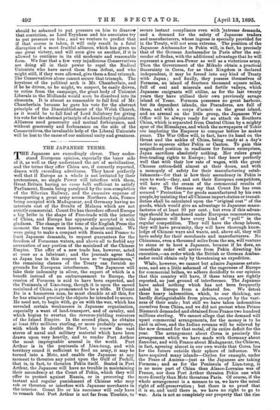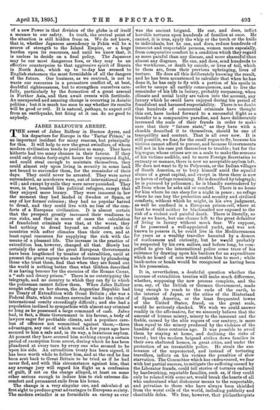THE JAPANESE TERMS. T HE Japanese are exceedingly clever. They under-
stand European opinion, especially the baser side of it, as well as they understand the art of mobilisation, and the terms they offer China are, if correctly reported, drawn with exceeding adroitness. They know perfectly well that if Europe as a whole is not irritated by their pretensions, no single Power will interfere with them, Great Britain having no casus belli sufficient to satisfy Parliament, Russia being paralysed by the non-completion of the Siberian Railway, and the excessive expense of transporting a great army across Northern Asia, France being occupied with Madagascar, and Germany having no interests east of the Straits of Malacca which are not strictly commercial. Count Ito has therefore offered Europe a big bribe in the shape of Free-trade with the interior of China, and Europe has apparently accepted it with gladness. The change in the tone of the English Press the moment the terms were known, is almost comical. We were going to make a compact with Russia and France to limit Japanese demands, to request guarantees for the freedom of Formosan waters, and above all to forbid any annexation of any portion of the mainland of the Chinese Empire. The offer of a new trade has, however, acted at once as a lubricant ; and the journals agree that as Japan has in this respect been so " magnanimous," the remaining clauses of the Treaty can furnish no grounds for European interference. The Japanese will take their indemnity in silver, the export of which is a benefit instead of an embarrassment to Europe, the cession of Formosa is said to have been expected, and the Peninsula of Liau-tung, though it is upon the sacred mainland of China, is pronounced to be a trifle. If Count Ito is a humorous man, he must chuckle at all this, for he has attained precisely the objects he intended to secure. He need not, to begin with, go on with the war, which has revealed certain weaknesses in Japanese organisation, especially a want of land-transport, and of cavalry, and which begins to overtax the revenue-yielding resources of the Island Empire. In the second place, he obtains at least fifty millions sterling, or more probably seventy, with which to double the Fleet, to renew the vast stores of naval and military material which have been drawn upon very heavily, and to render Port Arthur the most impregnable arsenal in the world. Port Arthur is in the peninsula of Liau-tung, and with territory round it sufficient to feed an army, it may be turned into a Metz, and enable the Japanese at any moment to threaten any point upon the Gulf of Pechili, that is, in fact, to threaten Pekin itself. Seated in Port Arthur, the Japanese will have no trouble in maintaining their ascendency at the Court of Pekin, which they will offer to protect against Russia, or in procuring the instant and regular punishment of Chinese who may rob or threaten or interfere with Japanese merchants in the interior. Count Ito or his successor will only have to remark that Port Arthur is not far from Tientsin, to secure instant compliance even with :extreme demands, and a demand for the safety of Japanese traders and manufacturers, whose ingress is specially provided for in the Treaty, will not seem extreme. The position of the Japanese Ambassador in Pekin will, in fact, be precisely that of the German Ambassador in Paris after the sur- render of Sedan, with the additional advantage that he will represent a great sea-Power as well as a victorious army. Then the Government of the Mikado obtain a practical Suzerainty in Corea, for as that Kingdom is declared independent, it may be forced into any kind of Treaty with Japan ; and finally, they possess themselves of Formosa, an island of fourteen thousand square miles, full of coal and minerals and fertile valleys, which Japanese emigrants will utilise, as for the last twenty years they have utilised their own previously savage island of Yesso. Formosa possesses no great harbour, but its dependent islands, the Pescadores, are full of them, and with a corps d'arm6e on the great island, and an arsenal on the little group, the Japanese War Office will be always ready for an attack on Southern China, which is separated from Central China by a mighty spur of the Himalayas, and which the newspapers of Tokio are imploring the Emperor to conquer before he makes peace. The War Office will, in fact, have its hand on the throat and the ankles of China, being ready at ,a day's notice to squeeze either Pekin or Canton. To gain this magnificent position in readiness for future enterprises, Japan sacrifices absolutely nothing. Her rulers grant free-trading rights to Europe; but they know perfectly well that with their low rate of wages, with the great Chinese cotton-field almost at their doors, and with a monopoly of safety for their manufacturing estab- lishments—for that is how their ascendency in Pekin is sure to work—they, and not their European competitors, will have all the cream of the commercial results of the war. The Germans say that Count Ito has even secured " Protection " for goods manufactured by his own people, by insisting that all Chinese import-duties or transit- duties shall be calculated upon the " original cost " of the goods, which would give an advantage to Japanese manu- factures of at least 30 per cent. ; but even if this advan- tage should be abandoned under European remonstrances, the Japanese will have every kind of " pull " in the regular competition. They will have the cheap labour, they will have proximity, they will have thorough know- ledge of Chinese ways and wants, and, above all, they will have safety for their merchants and manufacturers. No Chinaman, even a thousand miles from the sea, will venture to stone or to hoot a Japanese, because if he does, an immediate order will arrive from Pekin directing his execution,—an order which the British or German Ambas- sador could obtain only by threatening an expedition.
While, however, we cannot but admire Japanese astute- ness, and are a little ashamed of the eagerness of Europe for commercial bribes, we adhere decidedly to our opinion that this country will have, if these terms are rightly reported, no just ground of interference. The Japanese have asked nothing which has not been frequently asked in Europe from a defeated foe. We detest these heavy indemnities, which, to our thinking, are hardly distinguishable from piracies, except by the vast- ness of their scale ; but still we have taken indemnities ourselves from China, and we did not protest when Prince Bismarck demanded and obtained from France two hundred millions sterling. We cannot allege that the demand will upset commercial arrangements, for the money is to be paid in silver, and the Indian revenue will be relieved by the new demand for that metal, of its entire deficit for the year. The arrangement about Corea is precisely the arrangement which we have made with Germany about Zanzibar, and with France about Madagascar, the Chinese, in fact, agreeing almost in our own words that Corea lies for the future outside their sphere of influence. We have acquired many islands—Ceylon for example, under the Peace of Amiens—just as the Japanese are taking Formosa ; and as for the Peninsula of Liau-tung, it is no more part of China than Alsace-Lorraine was of France, nor does Port Arthur threaten Pekin one whit more directly than Metz threatens Paris. Of course, if the whole arrangement is a menace to us, we have the usual right of self-preservation ; but there is no proof that it is so, and until there is, we have no right to go to war. Asia is not so completely our property that the rise of a new Power in that division of the globe is of itself a menace to our safety. In truth, the central point of the situation is still hidden from us. We do not know, that is, whether Japanese ascendency in Pekin will be a source of strength to the Island Empire, or a huge burden upon its resources, and until we know that, it is useless to decide on a final policy. The Japanese may be our most dangerous foes, or they may be an effective counterpoise to that aggressive spirit of Russia in North Asia, which up to to-day has seemed to English statesmen the most formidable of all the dangers of the future. Our business, as we contend, is not to waste our resources in a premature conflict of, at best, doubtful righteousness, but to strengthen ourselves care- fully, particularly by the formation of a great arsenal in Further Asia, and then await events with fortitude. An unexpected and amazing change is occurring in Asiatic politics ; but it is much too soon to say whether its results will be good or evil. It is natural, perhaps, to expect evil from an earthquake, but firing at it can do no good to anybody.



































 Previous page
Previous page